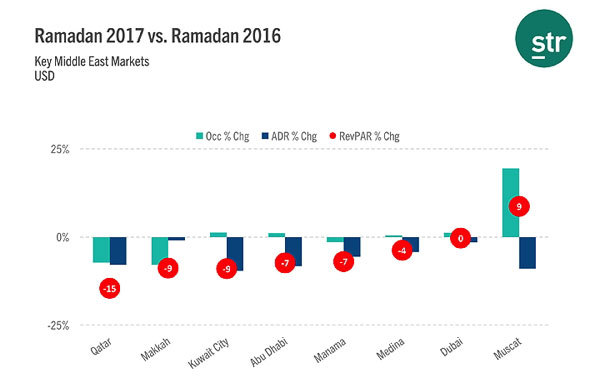✕

Column: industry Tag: hotel markets,Gulf Cooperation Council of countries,Ramadan in 2017,STR Published: 2017-07-11 17:20 Source: Author:
Most major hotel markets in the Gulf Cooperation Council reported performance declines when comparing Ramadan 2017 with Ramadan 2016, according to preliminary data from STR.
STR compared the 2017 dates of 26 May through 25 June with the 2016 time period of 6 June through 6 July. Muscat, Oman, was the only market analyzed that reported an increase in revenue per available room (+8.7%). The market’s 19.4% increase in occupancy outweighed a 9.0% drop in average daily rate (ADR).
Dubai, United Arab Emirates, was the only other market that did not report a significant decline in RevPAR, although performance was nearly flat as a decline in ADR (-1.5%) countered an uplift in occupancy (+1.2%).
According to STR analysts, growing hotel supply and geopolitical issues are affecting the region’s performance. School terms also factored into performance results—Saudi Arabia’s school term finished earlier, while school in some countries continued through the Ramadan period.

Makkah, Saudi Arabia, reported an 8.8% decline in RevPAR, which was primarily the result of a 7.9% drop in occupancy to 74.3%. STR analysts note that key religious tourism source markets, including Egypt and Indonesia, are currently facing currency devaluations against the Saudi Arabian Riyal, making it less affordable for potential visitors from those nations to embark on pilgrimages.
Also of note, Qatar reported an occupancy decrease of 7.2% and a drop in ADR of 8.3%.
STR provides clients from multiple market sectors with premium, global data benchmarking, analytics and marketplace insights. Founded in 1985, STR maintains a presence in 10 countries around the world with a corporate North American headquarters in Hendersonville, Tennessee, and an international headquarters in London, England.
Previous:Hotel revenue managers no longer ‘behind the scenes’
Next:Regensburg: The little city that took on the OTAs
Hot key words
Hot Products
Popular Vendors